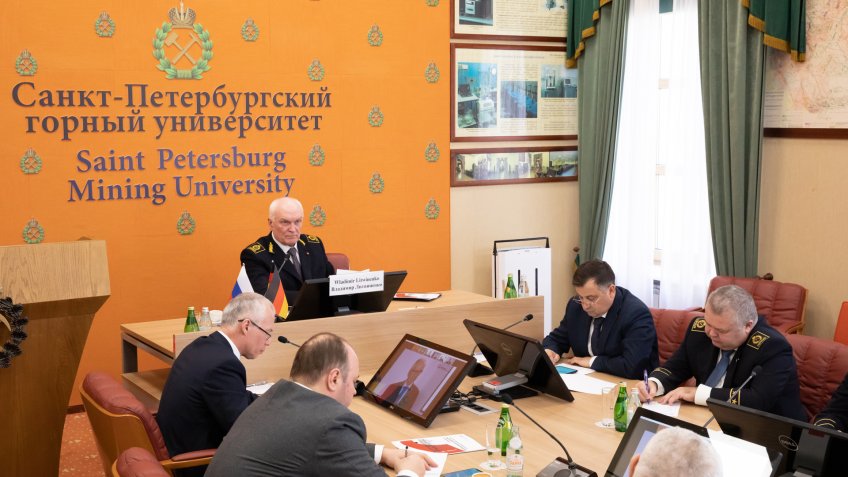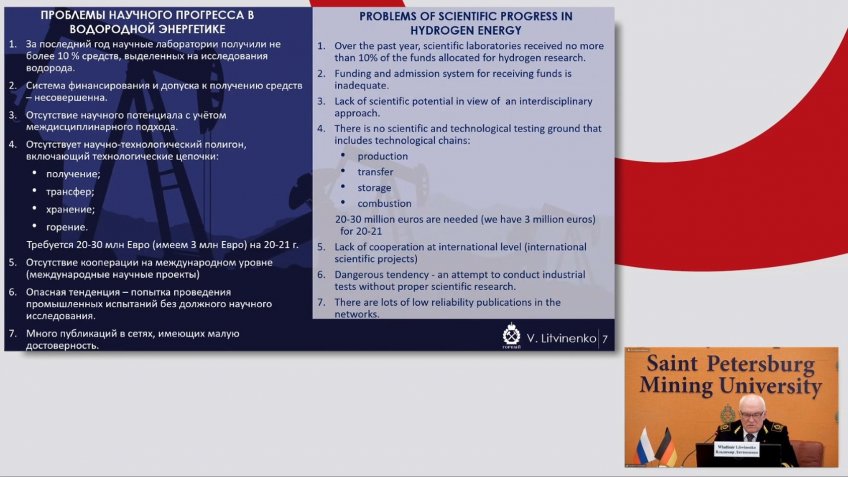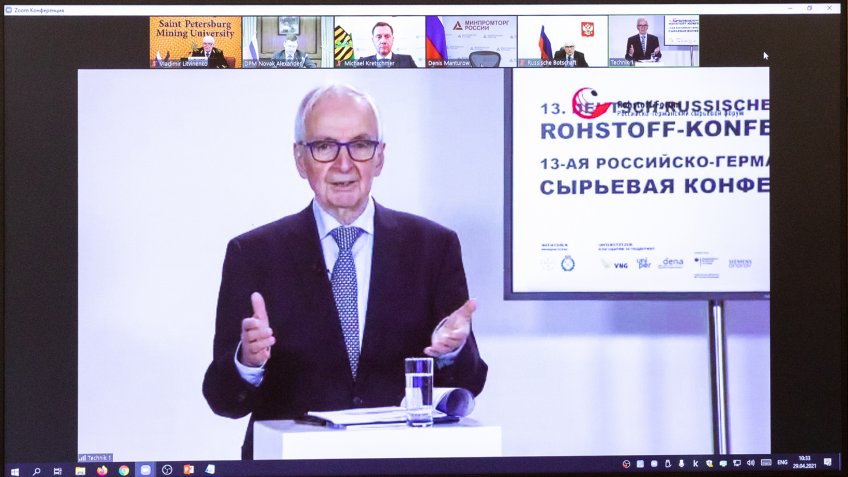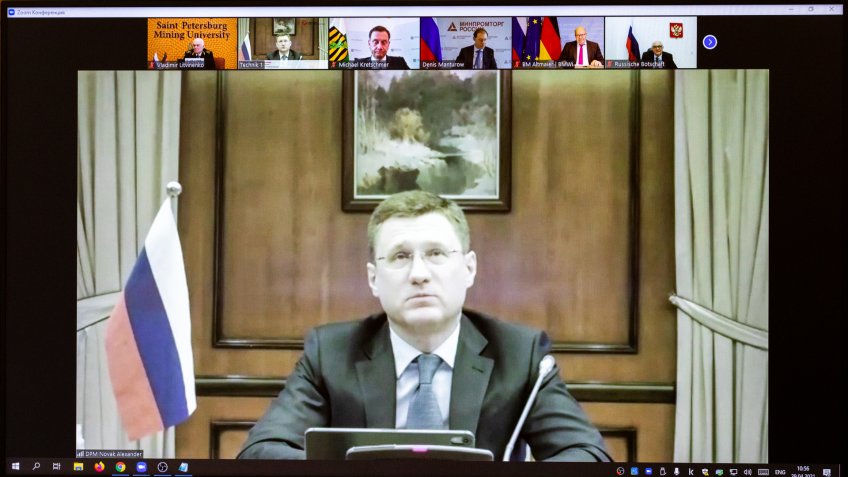
Politicians, scientists, and business representatives from our country and Germany, who spoke at the opening ceremony, spoke in favor of the development of partnership, despite the U.S. sanctions.
On Thursday, April 29, the 13th German-Russian raw materials forum kicked off. It was supposed to be held in Leipzig, but due to the complicated sanitary and epidemiological situation, the conference was moved to a virtual space. Most delegates from both sides noted that they would have preferred a face-to-face meeting because only this format allows establishing a full-fledged dialogue of trust. At the same time, they found a positive moment in today’s realities - the online mode allows more stakeholders to join the discussion of the prospects for cooperation between states. Those who for various reasons could not make it to Saxony in person.
What did the participants, many of whom supported the creation of this discussion platform, talk about? Firstly, they all pointed out that Germany’s demand for natural gas will be growing for many years to come, which is why completing the Nord Stream 2 is a cornerstone issue for the German economy. Secondly, they stressed that the cooperation between our countries in the energy sector started over 50 years ago and has been reliable and mutually beneficial throughout this history, which is very important for the joint work in the future. And third, they expressed confidence that it is only possible to respond adequately to today’s challenges - the coronavirus pandemic, climate change, and many others - by working together.
Michael Kretschmer, Prime Minister of the German state of Saxony, said that today on the sidelines of the forum there is “a central dialogue between Russia and Germany. It is the dialogue that sends signals to the public of our countries about the state of bilateral relations and the vector of their development in the energy sector, the cornerstone for the sustainability of any national economy.” He also admitted that he was “deeply impressed by the large-scale work being carried out in our country today to reduce CO2 emissions” and said he was in favor of the soonest possible commissioning of the Nord Stream 2 gas pipeline.
“We, Germany, of course, need a reliable supply of natural gas from Russia. That is where about 40 percent of all methane gas consumed by the European Union comes from. That’s why we would like to complete the new pipeline as soon as possible, which will increase our energy security,” said the head of Saxony, who opened the conference as its patron.
Vladimir Litvinenko, the Rector of St. Petersburg Mining University, one of the initiators of the forum fifteen years ago, and today its Russian co-chairman, noted that every year more and more new partners join the conference and their efforts bring tangible results. So, now “Dresden University of Technology has actively joined the joint work.” And the German academic exchange service DAAD has allocated additional funds to increase the mobility of undergraduate and graduate students from Russia. This means that after the pandemic is over, even more of our young people who are studying to become engineers will be able to go for internships in German universities or even get a European degree there.
At the same time, Vladimir Litvinenko has drawn attention to the need to increase the level of trust between Russia and the EU. Recent events, such as the expulsion of our diplomats from the Czech Republic, certainly do not contribute to this and are reflected, among other things, in the economy, which cannot exist apart from geopolitics.
“Russian miners understand that distrust is growing, and this creates a certain discomfort. Because our country has to develop essentially in a mobilization economy, we have to, whether we like it or not, strengthen the military-industrial complex. There is no need to gloss over it, the problem exists and we should take it into account while trying to contribute to the expansion of friendly relations,” said the Rector of Mining University.
He also drew the attention of the conference participants to the fact that in Western society discussions on the prospects of achieving carbon neutrality now focus not so much on the need to reduce the volume of greenhouse gas emissions, as on the calls to abandon fossil fuels, including natural gas. Given that hydrocarbons are the backbone of the global fuel and energy complex, this is a very dangerous trend.
“You can feed the public all you want with promises of an imminent energy transition or the introduction of hydrogen as a global energy resource. But the reality is that reduced investment in the exploration and exploitation of oil and gas fields will lead not to emissions reductions at all, but electricity shortages and the abandonment of greenhouse gas capture innovations by thermal power plants due to a lack of funds. At the same time, hydrogen, on which today we have great hopes, may well not justify them,” Litvinenko said.
The co-chairman of the forum noted that judging by the publications in the press, hydrogen-powered cars do not ply our streets in huge numbers only because of a lack of “goodwill.” However, this interpretation suggests either that the authors are biased or unprofessional. In fact, science has not yet solved numerous technical problems associated with the safe transportation and storage of H2, as well as with its use in the home (it is much more explosive than methane).
“Long years of scientific research are needed to seriously speculate about the prospects for hydrogen. We can’t skip this stage and start industrial tests right away. Then a market must be created, which now does not exist in principle, and its saturation must take place. Will this happen in reality? I strongly doubt it, if only because the energy profitability in the case of complete abandonment of hydrocarbons will be much lower than it is today. This will lead to a decline in the sustainability of the entire economy and a deterioration in the quality of life for all of us,” warned the rector of Mining University.
The German participants were much less skeptical about the prospects of hydrogen than their Russian colleagues. But they stressed that this is the main value of the German-Russian Forum on Raw Materials. The existence of such a platform allows for discussions and the exchange of often opposing opinions, which ultimately makes it possible to work out the best solution.
In particular, Klaus Töpfer, former Minister of the Environment of Germany and co-chairman of the conference on the German side, spoke about this. He stressed that the more joint projects Russia and the Federal Republic of Germany implement, the more reference points for the development of partnership relations will appear between our countries.
"Soon the global population will reach 8 million. And when I was born, this figure was four times less. At the same time, the average age of people in Germany is now 44 years, and in African countries, it ranges from 18 to 22 years. We need to create new jobs there so that all these kids have a future. We have to respond to this challenge, like too many other challenges of our time. But to do that we need to cooperate, to build bridges. This is our top priority," Mr. Töpfer said.
Peter Altmaier, Germany’s Minister for Economic Affairs and Energy, who spoke next, recalled that Klaus Toepfer had asked him to run for the Bundestag in 1994. Almost 30 years had passed since then. That is how long until 2050, the deadline when Germany plans to achieve carbon neutrality. However, this does not mean that Berlin will start reducing its consumption of hydrocarbons now.
“For half a century now, first the USSR and then Russia have been ensuring a reliable supply of natural gas to our country. The demand for it will continue to grow, especially since production in the Netherlands is gradually decreasing, which means that the EU will increase the volume of imports. This is a transitional technology, a bridge between the old and new energy systems. Someday mankind will cross this bridge and give it up. But when will this happen? Discussions are ongoing, and the goals have not yet been clearly defined,” Altmaier said.
He assured those present that Russia and the Federal Republic of Germany have a lot of other promising areas of cooperation, in addition to energy. This is the development of the digital economy, recycling industrial waste, and fighting against climate change. The minister assured those present that he was ready to come to Moscow to discuss in more detail the potential for our cooperation with our colleagues from the Russian government.
“I would like to thank Klaus Töpfer and Vladimir Litvinenko for the fact that this forum exists and that we can meet on its site, even if it is still virtual. I am sure that in the future it will increase its importance even more,” Mr. Altmaier summarized his speech.
Deputy Prime Minister of the Russian Federation Alexander Novak also emphasized in his speech Vladimir Litvinenko’s personal contribution to forming such a representative discussion platform, increasing the level of higher technical education, and popularizing science. In addition, he congratulated Mining University for winning the highest among Russian universities 12th place in the subject ranking of the British agency QS.
The Deputy Prime Minister agreed with his German colleague that natural gas is a kind of bridge between different energy systems. However, he noted that the peak in demand for it will not be passed very soon and therefore it is not possible to see the other side yet. At the same time, Russia is doing everything in its power to bring this moment closer. Already now the share of clean energy in our country (solar power plants, wind farms, hydroelectric and nuclear power plants) is 41%.
"We intend to steadily increase this figure, including through legislative initiatives to control greenhouse gas emissions, create incentives to reduce it, and introduce the so-called green certificates. At the same time, when talking about CO2 emissions, we must not discriminate against traditional energy sources - the basis of our fuel and energy balance. It is necessary to introduce technologies that reduce their negative impact on the environment, rather than fighting them as an absolute evil. On the way to making the fuel and energy complex “cleaner,” we must avoid energy shortages and collapses such as those that occurred in Texas. As you remember, last winter its residents found themselves on the verge of survival as a result of a poorly miscalculated energy course and excessive enthusiasm of the state authorities for renewable sources," said Alexander Novak.
For his part, Germany’s Minister for Economic Cooperation and Development, Gerd Müller, also identified potential areas for cooperation between Russia and Germany beyond energy. These are, for example, the fight against poverty and hunger, climate change, as well as the melting of permafrost, which emits huge amounts of methane, an even more dangerous gas for the environment than CO2. He stressed that all these problems can only be solved together.
Head of the Ministry of Industry and Trade of the Russian Federation Denis Manturov noted that “Russia hopes for a balanced approach of the European Union when introducing the carbon tax, equal conditions for all manufacturers and compliance with WTO norms.” Besides, he told our western partners that our country is going to produce its own buses, locomotives, and vessels running on hydrogen. And to motivate the automakers to take part in the decrease of anthropogenic influence on nature the government plans from 2030 to set requirements to the share of car sales with engines working on electric traction and hydrogen fuel cells.
The Russian-German Raw Materials Forum, which is organized by the International Center of Competence in Mining Engineering Education under the auspices of UNESCO, will finish its work on Friday, April 30. Kirill Molodtsov, Assistant to the Head of Administration of the President of the Russian Federation, Sergey Nechayev, Ambassador of the Russian Federation in Germany, Natalia Komarova, Governor of Khanty-Mansiysk Autonomous Okrug - Ugra, Pavel Sorokin, Deputy Energy Minister, Andrey Guryev, head of PhosAgro, Oleg Aksyutin, deputy chairman of Gazprom, Ulf Heitmuller, head of VNG energy company, Klaus-Dieter Maubach, Uniper, Andreas Kulmann, German Energy Agency (Dena) intend to take part in it along with many other prominent figures.








